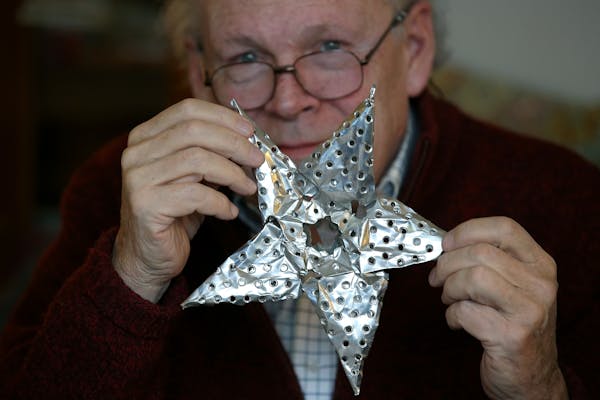The year was 1948. Rob Brown had just turned 11, when his father brought home a tin star to top their Christmas tree in New Rochelle, N.Y.
It wasn't just an ornament; it was a promise.
Six months earlier, Brown's father had quit drinking and joined Alcoholics Anonymous. The star was "part of the much-improved Christmases to come as he made amends to his family," Brown said.
Brown's father was never a mean drunk. "He was just so absent — mostly sleeping in a chair," Brown said. But he had overheard arguments between his parents, and he later learned that his mother had threatened to take the kids and leave — unless their dad quit drinking.
"As a family, we were doing virtually nothing," Brown recalled of his early years. But after his dad gave up alcohol, he embraced Christmas — from decorating the tree to stomping fireplace ashes with rubber boots to suggest Santa's footprints. Brown himself always placed the tin star on a white bulb at the top of the tree.
Brown and his dad bonded over Lionel trains. They'd pore over catalogs, circling the gifts Brown hoped to receive on Christmas. Then they designed elaborate tracks that eventually took over the "top room" in their modest split-level. "I had a wonderful relationship with my father," he said.
Brown grew up, went to Dartmouth and landed a job in broadcast promotion that brought him to Minneapolis, where he met his wife, Anne. He and a colleague eventually started their own public relations firm. Life was good. With one exception: Now Brown was the one drinking too much.
It was the "Mad Men" era, when businessmen in skinny ties downed cocktails during the workday. For Brown, it was Manhattans at lunch, and martinis after work. Until one Tuesday in May 1978, when he came home in the middle of the day, too hungover to work.
Alone in the house (his wife was at her nursing job), he thought about his life, which had been blessed in every way. "I sign my own paychecks. I'm married to a former Miss Edina. I have a lovely home. Why was I destroying myself with booze? I was feeling like I'd been run over by a truck — and the truck was me."
He called a friend, who brought him to his first AA meeting. His wife was relieved. She hadn't threatened to leave, but she had "stopped buying and stopped pouring. And there wasn't going to be a child until I quit. She told me that afterward," Brown said.
His mother, who'd been widowed three years earlier, told Brown something that shocked him: He quit drinking 30 years to the day — and the hour — that his father had.
Brown was like his father in yet another way. Once he gave up alcohol, his life became richer. "You go back to the interests and hobbies you had before you were drinking," he said. His included shortwave radio and World War II history. He slept outdoors in subzero weather to raise money for charity, six times.
Best of all, he and his wife soon welcomed a daughter. And Christmas, he said, "became a great deal of fun."
Several years ago, Brown's elder sister died, and he traveled south to help her family with her belongings. There, packed in a box, he found the old tin star. Bent and battered, it was held together with layers of Scotch tape and staples, and had a tag in his sister's handwriting that read: "Retired in 1996 and Inducted to the Christmas Hall of Fame."
Brown knew he had to have it. "Hell's bells! That star is like my Rosetta Stone."
He brought the star home and hung it in a window overlooking the downtown Minneapolis skyline, in the apartment where he'll soon celebrate Christmas with his wife, their daughter and her husband, who both work in Washington, D.C., and are expecting the Browns' first grandchild.
The star is much more than a decoration — it represents sobriety, and a gift his father didn't know he was giving when he bought the trinket so many Christmases ago.
"My dad lived 27 great sober years. I had a role model. … He's alive for me every day of my life."
Kim Palmer • 612-673-4784
In heated western Minn. GOP congressional primary, outsiders challenging incumbent

Minnesota Sports Hall of Fame: A class-by-class list of all members

This retired journalist changed professional wrestling from Mankato

